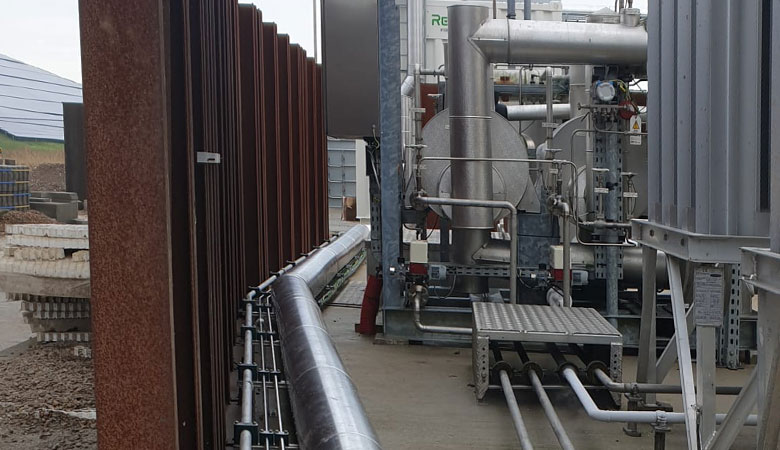IC has more than 40 years of experience in designing and installing insulation systems for fixed and transportable tanks, vessels and trailers. The thermal, cold and cryogenic insulation is used for proper temperature control of tanks with both liquids, emulsions and gases.
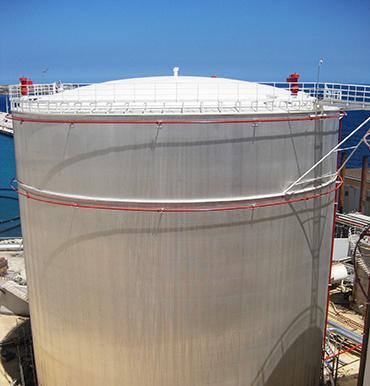
Tank insulation for fixed tanks
When storing liquids in tanks, it is often important that the contents of the tanks be maintained at a constant temperature. In addition to a temperature retention, in many situations it is also necessary to take into account the reduction of energy losses, moisture influences, possible gas exchanges and effects of light. Also, the formation of condensation within the tank insulation should be avoided. IC helps with the design and provides a professional installation of your tank insulation. With this it will create a better balance between the temperature in the tank and the outside temperature and keeps your product optimally cold or hot.
Insulation solutions for mobile tanks & trailers
IC has a lot of experience in applying PU (polyurethane) insulation to trailers and transportable tanks including tanks for transporting liquid CO2 gas. The insulation is applied in combination with corresponding vapour screens and plate finishes. A PU insulation system is easy to install, even on existing tanks, and can be repaired quickly in case of damage. In addition, insulation with polyurethane material is relatively light, which reduces fuel costs in transport. IC carries out the insulation of tanks in very varying sizes from a few decimeters to tens of meters.
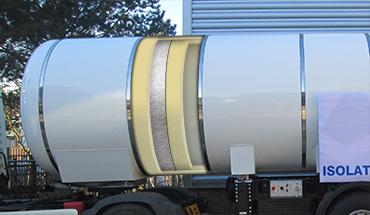
For more information on the isolation of CO2 tanks, see our Case study sheet Cold insulation of trailers and tanks and the news item Insulation of tanks and trailers for CO2 transport.
Cryogenic LNG, LPG, O2, N2 tank insulation
The liquefaction, storage and transportation of cryogenic media such as LNG (-160°C) or LPG requires high-performance insulation systems. Parameters such as thermal stresses, vibrations and required safety provisions have to be considered when engineering, manufacturing and installing cold insulation systems for these applications.
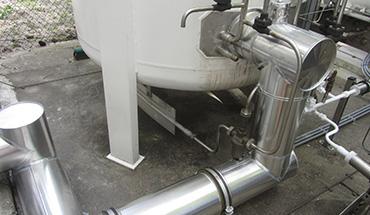
Insulation systems for liquid oxygen (-183°C) and liquid nitrogen (-196°C) require again a different kind of approach. For example, the insulation and cladding of liquid oxygen vessels or pipes must be absolutely grease free to avoid any risk on spontaneous ignition.
Interested?
IC is a supplier with a lot of experience in the field of tank insulation with a high reliability and quality at a competitive price. Our facility is designed to isolate large systems and trailers within a relatively short time frame. We also install systems on location with much attention to safety. Contact IC for more information and a project tailored to your project. More information about the solutions for cold and cryogenic insulation and thermal process isolation you can find under the menu item products.
In line with the increased use of hydrogen in industrial and building environments, as well as consumer applications, insulation and fire protection are ever more important factors in the design and installation of hydrogen pipelines and storage tanks, not to mention filling stations. Hydrogen is a very flammable gas, and it is essential to ensure that all components of a hydrogen fuel system are correctly insulated and protected against fire risks. In addition, hydrogen is often stored at very low temperatures, which requires a certain level of thermal insulation to prevent energy loss and undesired ice formation on pipelines and tanks.
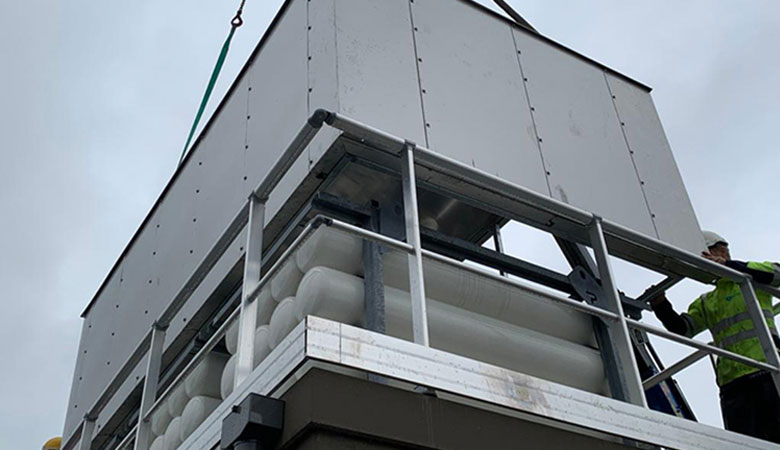
Thermal and cryogenic insulation for liquid hydrogen installations
One important element in the insulation of hydrogen systems is the use of suitable materials. It is not only the material selection for the thermal insulation material that is important, but also the installation method and finish are relevant for achieving high-quality and safe insulation. Every imperfection or damage to the damp-inhibiting layer can result in significant ice formation. Deficiencies may not only pose a threat to the process and affect the quality of products, they can also cause significant energy and evaporation losses or undesirable corrosion.
Isolatie Combinatie is experienced in the designing, manufacturing and installing of insulation systems for hydrogen and liquid hydrogen installations. The tailor-made systems offer a high-quality finish with panel material. We will gladly help you make the right choice for your purposes.
Fire protection for hydrogen filling stations and hydrogen storage
Hydrogen is a highly flammable gas, and it is essential to ensure that all components of a hydrogen system are properly protected against fire risks. This includes things like active security systems but also involves measures that offer passive protection in the event of a fire. Hydrogen fires often occur in the form of jet fires which can be very dangerous.
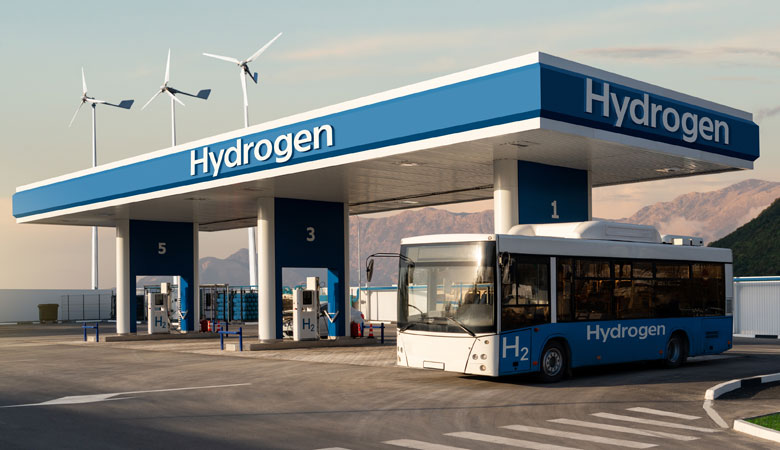
What is a jet fire?
A jet fire can occur in the event of a malfunction or damage to a high-pressure gas installation containing, for example, hydrogen, natural gas or CNG. The escaped and flammable gas ignites, causing a jet fire. The flame created by a jet fire is highly erosive with significant force in the direction of the jet stream. Fighting this type of fire can be very difficult, even for highly trained firefighters and staff.
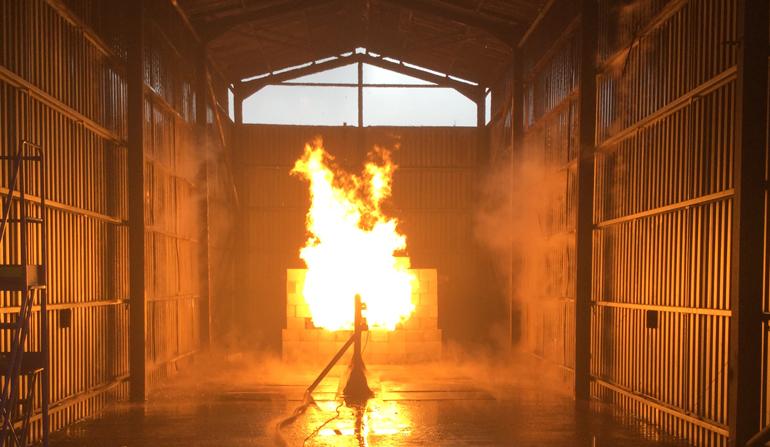
IGNIS-PFP panel - JF150 jet fire protection box or panel
An IGNIS-PFP panel or wall from Isolatie Combinatie offers the ultimate protection for installations and staff in the event of jet fires. The systems are completely custom made to align with the onshore or offshore application. The panels are tested and Lloyds certified under ISO standard 22889-1 and offer a fire-retardant protection of 2.5 hours under exposure to extreme jet fire pressure.
Installation of fire protection, insulation systems and inspections
In addition to the manufacturing and installation, Isolatie Combinatie also provides aftercare in the form of maintenance and periodic inspections. We can also offer assistance in the event of future removals and/or installation of cabinets, walls and/or panels. Tailored service agreements are available on request.
More information?
In summary, insulation and fire protection systems are crucial elements of hydrogen systems, storage tanks and filling stations. Through the use of the right materials and taking suitable insulation and passive fire-protection measures, the safe and efficient functioning of a hydrogen system can be guaranteed. Via the block on the right-hand side of this page, you can contact us or request a quote for an insulation or fire-protection solution for your hydrogen installation.
Isolatie Combinatie IC provides industrial insulation solutions by means of thermal, acoustic, cold and cryogenic insulation systems for your factory, machine, tool, process line or tank.
Thermal insulation
The need to install thermal insulation at industrial processes often results from an attempt to increase safety, quality and reliability of processes, while reducing energy consumption and CO2 emissions at the same time. Already for more than 40 years IC designs, manufactures and installs bespoke solutions for efficient insulation of heat generating and cold processes, including cryogenic systems. Where necessary the thermal insulation systems for process lines or tanks can also be provided with heat tracing.
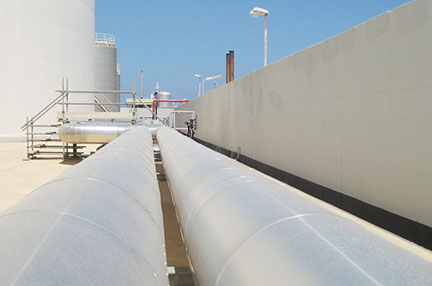
Savings as result of industrial insulation
Great savings can be realized with well-designed thermal insulation. Not only savings on production costs but, they can also indirectly reduce CO2, NOx and SO2 emissions. IC can perform calculations to substantiate these values. For example, insulation of a typical valve in a piping system with a temperature of 110 oC can already save approximately 1,500 M3 of natural gas. This equals the average annual use of a Dutch household. Besides the energy savings the CO2 emission is also reduced by 3.5 mT.
Acoustic insulation
High noise levels often occur around machines, processes that work with high pressures or fast flowing processes with turbulent media. Acoustic insulation for industrial applications generally has two purposes; To protect staff who operate in or near the installations and to reduce noise emissions to the environment, especially in densely populated areas. IC has years of experience in solving noise reduction issues and the application of acoustic industrial insulation.
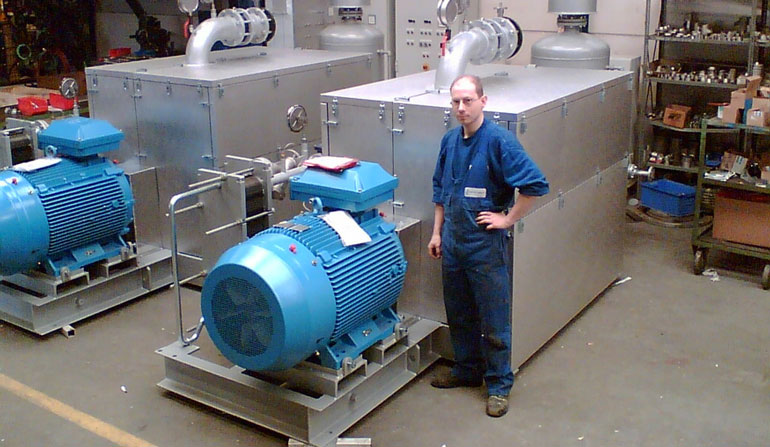
Safety and industrial insulation
Within the IC organization safety has the highest priority in all our activities. This focus arises not only from policy statements, manuals and systems such as our VCA** safety/health system, but is the result of ongoing safety awareness at all our employees and selected subcontractors.
Our approach
In the most ideal situation IC is already involved in a project during engineering phase when making the design of industrial insulation systems. In this way, our clients benefit the most of our knowledge and practical, hands on approach. Sometimes little changes in the design can lead to large reductions in costs and lead times. Often, we hear that our approach, as a real partner has brought the project to a higher level. A level with much advantages for the client both in terms of savings and long-term improvement in efficiency.

Interested?
Do you require insulation for a machine, factory, process line or tank? In brownfield situations, our recommendation is to start with a site survey. With the collected information and the insulation requirements we can make a plan of approach. Including all project aspects such as for example design, operational planning and priorities in installation. Please contact us for more information on our industrial insulation solutions.


 English
English  Nederlands
Nederlands  Deutsch
Deutsch 